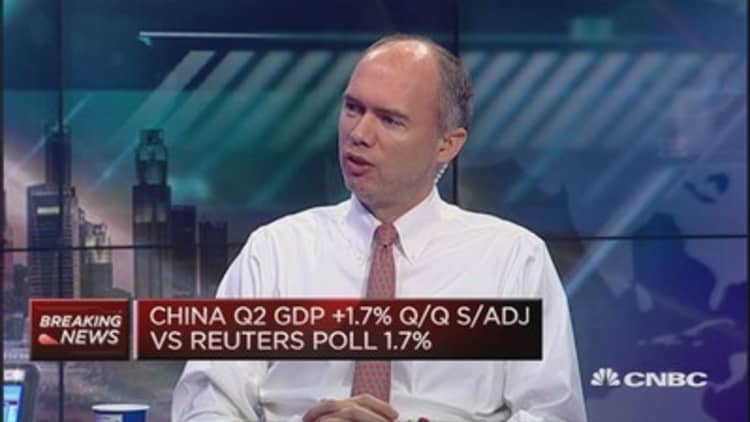Asian equities were mixed on Wednesday, with Shanghai stocks deepening losses despite better-than-expected Chinese gross domestic product data.
The world's second-largest economy grew 7 percent on year in the April-June period, unchanged from the previous quarter but slightly better than Reuters estimates for a 6.9 percent rise. A spokesperson for the country's statistics bureau insisted that the figure was accurate, denying accusations that it was inflated, Reuters reported. Other data released on Wednesday showed June industrial output and retail sales also beating forecasts.
The decline in mainland stocks has nothing to do with Wednesday's economic data, Fraser Howie, director at Societe Generale Prime Services, told CNBC. "China's economy and its stock market are completely uncorrelated at the moment. There's been so much volatility in the market that the GDP print would have to be substantially different than estimates in order to change things."
The idea that positive data will limit future stimulus is also hurting mainland equities, noted Chris Weston, IG's chief market strategist.
Meanwhile, Greece remains in the spotlight after Prime Minister Alexis Tsipras went on national television on Tuesday, saying the country has no choice but to accept what he called a "one-way street" European bailout deal. Faced with opposition from his own Syriza party, Tsipras urged passage of the deal in a parliament vote later today, adding that banks would not be able to open until the agreement was ratified.
Read MoreGreece, China fears push cash levels to Lehman highs
Oil prices were modestly higher during Asian trade following an overnight rebound as investors reassess when Iranian crude could return to markets following Tehran's landmark nuclear deal on Tuesday.
Shanghai drops 3%
China's benchmark Shanghai Composite extended losses into a second day, retreating further from the key 4,000 level, after snapping a three-day rally on Tuesday. Elsewhere in the mainland, the Shenzhen Composite and the ChiNext, a NASDAQ-style board, slumped more than 4 percent each.
News on Tuesday that two Chinese funds—China Asset Management and Harvest Fund Management— are ready to buy stocks after raising $6.4 billion each sparked speculation that the money might be from government-backed institutions, Reuters reported.
Brokerages continued to suffer heavy losses, with Everbright Securities slumping 9 percent and Citic Securities down nearly 4 percent.
Hong Kong's benchmark Hang Seng Index lost 0.4 percent, tracking mainland declines. But BOC Hong Kong rallied as much as 3 percent after announcing it plans to sell 100 percent of its stake in subsidiary Nanyang Commercial Bank for $8.8 billion—reportedly Hong Kong's largest sale to date.

Nikkei adds 0.4%
Japan's benchmark Nikkei index rose to its highest level since July 3, extending gains into a third session, despite the yen moving off a two-week low against the greenback hit in the previous session.
Read MoreJapan's economic transformation: Are we there yet?
Consumer electronic stocks were among the top gainers, with camera maker Olympus closing up 1.8 percent and Nintendo 2.5 percent higher.
Markets were little changed after the Bank of Japan (BOJ) left monetary policy unchanged, as widely expected, at the conclusion of a two-day review. The central bank also slightly cut its view on exports and output, adding that it expects the economy to continue recovering modestly.
ASX up 1%
Australia's benchmark ended at a new three-week high above the key 5,600 level, despite news that July consumer confidence fell 3.2 percent. Meanwhile, the Australian dollar added 0.3 percent against the greenback.
BHP Billiton ended 0.7 percent lower after saying that it expects a $2 billion post-tax impairment charge for its U.S. onshore energy business.
Mount Gibson surged 10 percent after reporting iron ore sales of 5.8 million tonnes for the 2015 fiscal year and confirming its ongoing cost-cutting efforts.
Financial services firm Challenger added 2 percent on news it is buying Dexion Capital for A$41 million.
Bradken soared 17 percent after confirming its fiscal 2015 earnings guidance, adding that it was unaware of the reason behind the stock's recent declines.
Kospi 0.6% higher
South Korean shares ended at their highest level since July 3, tracking Asia-wide gains, despite weak economic data. June exports dropped 2.4 percent on year, coming in worse than expected, while imports tumbled an annual 13.6 percent.
Construction firms rallied on expectations of more contracts from Iran following Tuesday's historic nuclear deal; Hyundai Engineering and Construction ended 3.6 percent higher while Samsung Engineering rose nearly 2 percent.

